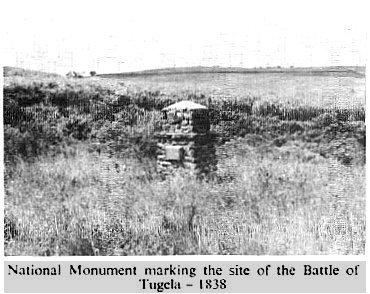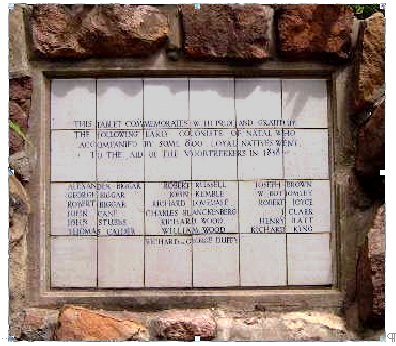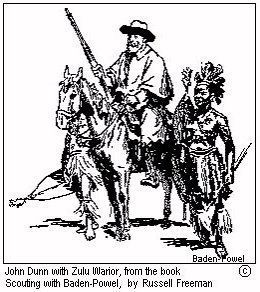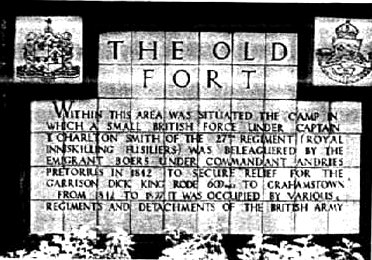RETURN
TO
HOMEPAGE - Richard and William Wood Book
BIOGRAPHIES OF RICHARD WOOD, WILLIAM WOOD (THE ELDER) AND
WILLIAM
WOOD (THE YOUNGER)
WOOD, RICHARD: Trader's assistant, carpenter, wagon
driver. He,
probably came to Natal with Collis in October 1831 for he
was employed
as a carpenter and assistant by Collis at Port Natal until Collis's
death
there In September 1835. R. Wood signed the letter requesting that
Gardiner
found a mission at the Bay, 14 March 1835. He attended the meeting held
at Port Natal on 23 June 1835, to plan the town of Durban and build a
church;
and he signed the petition of the same date to Sir B. D'Urban, asking
that
Natal be made a British colony.  R. Wood's wife and children, including
his young son William (q.v.), arrived at the Bay in Circe in September
or October 1835; they lived with him there in December 1835. As one
member
of the town committee of Durban, R. Wood granted Champion's request for
land on the Umlazi River, on 12 March 1836, and on 14 April he began
helping
Champion with the construction of Umlazi Mission. R. Wood served on the
commando led by Cane against the Swazis at Dingane's order, June to
August
1836. See Cane. With one of their interpreters, R. Wood brought the
American
missionaries' wagons, goods and supplies to GinanI from Umlazi, by 24
September
1836. He was in Natal during October and November 1836. In May 1837 R.
Wood was made a superintendent for the building of a fort at Port
Natal.
See A. Biggar. He served in both forces collected by the settlers to
fight
the Zulus after the Retief Massacre. March and April 1838. While on the
second commando. R. Wood was killed at the Battle of the Tugela, 15
April
1838. (AN. 1,296, 37~8. 38~5. Fy, 236, 25~6. GdZ, 77, 399-402. CinD,
8.60,
68.137. AMZ, 96. SinDi. 127. Th, II, 34~5.)
R. Wood's wife and children, including
his young son William (q.v.), arrived at the Bay in Circe in September
or October 1835; they lived with him there in December 1835. As one
member
of the town committee of Durban, R. Wood granted Champion's request for
land on the Umlazi River, on 12 March 1836, and on 14 April he began
helping
Champion with the construction of Umlazi Mission. R. Wood served on the
commando led by Cane against the Swazis at Dingane's order, June to
August
1836. See Cane. With one of their interpreters, R. Wood brought the
American
missionaries' wagons, goods and supplies to GinanI from Umlazi, by 24
September
1836. He was in Natal during October and November 1836. In May 1837 R.
Wood was made a superintendent for the building of a fort at Port
Natal.
See A. Biggar. He served in both forces collected by the settlers to
fight
the Zulus after the Retief Massacre. March and April 1838. While on the
second commando. R. Wood was killed at the Battle of the Tugela, 15
April
1838. (AN. 1,296, 37~8. 38~5. Fy, 236, 25~6. GdZ, 77, 399-402. CinD,
8.60,
68.137. AMZ, 96. SinDi. 127. Th, II, 34~5.)
WOOD, WILLIAM: (the elder William) Hunter, trader.
settler. He
was brother to Richard Wood and uncle to the younger William Wood,
served
on both the settlers' commandos against the Zulus, March and April
1838,
and was killed at the Battle of the Tugela, 15 April 1838. (AN.J. 384.
Th, II. 345,356. MCD, 226.)
WOOD. WILLIAM: (the younger William) Interpreter,
trader. hunter.
Mrs Richard Wood and her children, Including William, who was about 12
years old, came to Port Natal in Circe in September or October 1835, to
join her husband. William was put to school at Champion's mission on
the
Umlazi River in March 1836, but with his father's consent he left in
June
to become a trader. He began learning to speak the Zulu language during
his first months in Natal. W. Wood first visited Mgungundlovu with the
Hottentot Jan Brouwer about August 1836; he went at Dingane's request,
for the Zulu monarch wanted to see a white child. W. Wood stayed some
time
and perfected his spoken Zulu. He made a hunting and trading trip with
Russell in 1836 or 1837. In late 1837 W. Wood was serving as Dingane's
interpreter at Mgungundlovu, where he became Owen's interpreter in
December
1837, during Hulley's absence, and he remained in that capacity until
Hulley
returned on 9 February 1838. W. Wood witnessed the Retlef Massacre,
which
he had predicted. He returned to Port Natal with Owen and Hulley,
February-March
1838. W. Wood, his mother and her other children took refuge in Comet
at
the Bay of Natal to escape the Zulus, 17 to 24 April 1838. The family
left
Port Natal on 11 May 1838, probably in Comet, and reached Port
Elizabeth
on 22 June. Mrs R. Wood and the children proceeded to Grahamstown. (AN,
I 37~87. CmD, 141. Ow, 84,95. MCD, 171-2. NaV, 199, 209.)
Sunday, 24 November, 2002
Robert Dean Wood wrote: I just received this information from Anne
Lehmkuhl - South African research.
URL: http://www.rupert.net/~lkool/
Richard WOOD died on 16 Apr 1838 in the Battle of Tugela
buried
in Endondakasuka Hill Cemetery, District Lower Tugela
William WOOD died on 16 Apr 1838 in the Battle of Tugela
buried
in Endondakasuka Hill Cemetery, District Lower Tugela
TABLET IN THE GROUNDS OF THE OLD FORT IN ETHEKWINI
(DURBAN)
 THIS TABLET COMMEMORATES WITH PRIDE AND GRATITUDE
THE FOLLOWING EARLY COLONIST OF NATAL WHO
ACCOMPANIED BY SOME 800 LOYAL NATIVES WENT
TO THE AID OF THE VOORTREKKERS IN 1838
ALEXANDER BIGGAR - ROBERT RUSSELL - JOSEPH BROWN
GEORGE BIGGAR - JOHN KEMBLE - W BOTTOMLEY
ROBERT BIGGAR - RICHARD LOVEDALE - ROBERT JOYCE
JOHN CAIN - CHARLES BLANCKENBERG - J CLARK
JOHN STUBBS - RICHARD WOOD - HENRY BATT
THOMAS CALDE - WILLIAM WOOD - RICHARD KING
RICHARD? GEORGE DUFFY
Source:
J.L. KEENE
CHIEF CURATOR
www.militarymuseum.co.za
Ref: 623.19 Durban Old Fort
RW/dsb
23 October 2002
THIS TABLET COMMEMORATES WITH PRIDE AND GRATITUDE
THE FOLLOWING EARLY COLONIST OF NATAL WHO
ACCOMPANIED BY SOME 800 LOYAL NATIVES WENT
TO THE AID OF THE VOORTREKKERS IN 1838
ALEXANDER BIGGAR - ROBERT RUSSELL - JOSEPH BROWN
GEORGE BIGGAR - JOHN KEMBLE - W BOTTOMLEY
ROBERT BIGGAR - RICHARD LOVEDALE - ROBERT JOYCE
JOHN CAIN - CHARLES BLANCKENBERG - J CLARK
JOHN STUBBS - RICHARD WOOD - HENRY BATT
THOMAS CALDE - WILLIAM WOOD - RICHARD KING
RICHARD? GEORGE DUFFY
Source:
J.L. KEENE
CHIEF CURATOR
www.militarymuseum.co.za
Ref: 623.19 Durban Old Fort
RW/dsb
23 October 2002

Note: George Biggar was killed on 17th of
February 1838 at Blaauwkranz - he was 18 years old. His older brother
Robert Biggar died on the 17th of April 1838 at Tugela - he was 25
years old. Their father Alexander Harvey Biggar was killed on the 27th
of December 1838 near the White Umfolozi River.
The BIGGARs and the DUNNs
The English at the Bay sent sent two expeditions
against the Zulus (March/April 1838) - the second, culminating in the
first Battle of Ndondakusuka (Tugela) in which of the 17
Whites that sallied forth,
only four survived, and of the 800 Black followers 600 perished. Both
of
Ann Dunn's brothers (Robert Biggar and George Biggar -
sons of A.H. Biggar) where killed in the action packed
3 months .. on the 11th of May the Comet sailed for Delagoa Bay and
ultimately
Algoa leaving behind only about 9 of the Port Natal residents .. Mrs Ann
Dunn
and her children were on board ... her husband Mr Robert Newton Dunn
may have been among
the few who remained at Port Natal ..her father, Alexander Harvey
Biggar, remained in Natal and was killed in a Zulu ambush on
December 27th 1838 ....."
In October 1838 Mr Robert Newton Dunn bought the farm Sea
View (SeaView). The farm was near the property of his father-in-law
Mr AH Biggar. By 1842 he had bought a number of the properties of those
killed in the Battle of Tugela and had established a magnificent house
and premises at Sea View. It is said that the property enjoyed a view
of the ocean.
 John Dunn (1834-1895) son of Robert Newton Dunn -
John was one of the children on board the Comet
John Dunn (1834-1895) son of Robert Newton Dunn -
John was one of the children on board the Comet
In 1820, John's father, Robert Newton Dunn, left his home and family in
Inverness, Scotland. Lured by the promise of adventure and prosperity,
Robert joined the influx of British settlers on the eastern shores of
South Africa. Four years later, at Port Elizabeth, Robert married Anne
Harold Biggar, the daughter of British immigrant, Alexander Biggar.
Their union was to produce four children; Sarah Mary, Agnes, Louisa and
John.
John was born in 1834, the year the family moved northwards to Port
Natal (Durban). Ever eager to meet new challenges, Robert soon became a
successful hunter and trader. Financial secure, he built his family an
impressive homestead overlooking the Indian ocean, which he aptly named
"Sea View" where, nestled snugly in the undulating, verdant hills of
British controlled Natal, the Dunn family enjoyed a privileged colonial
lifestyle.
John did not allow his father's wealth to separate him from the
indigenous people of the area. He learnt to speak Zulu fluently; his
personality displaying an unique coalescence of European and Zulu
cultures.
For information compiled by:
Pat Dunn - Sue
Pattot - Rosemary Dixon Smith & Others
John Dunn
Foundation - Click Here
John Dunn Documents - Click
Here
TABLET IN THE GROUNDS OF THE OLD FORT IN ETHEKWINI
(DURBAN)

RETURN
TO HOMEPAGE - Richard
and William Wood Book
|



 R. Wood's wife and children, including
his young son William (q.v.), arrived at the Bay in Circe in September
or October 1835; they lived with him there in December 1835. As one
member
of the town committee of Durban, R. Wood granted Champion's request for
land on the Umlazi River, on 12 March 1836, and on 14 April he began
helping
Champion with the construction of Umlazi Mission. R. Wood served on the
commando led by Cane against the Swazis at Dingane's order, June to
August
1836. See Cane. With one of their interpreters, R. Wood brought the
American
missionaries' wagons, goods and supplies to GinanI from Umlazi, by 24
September
1836. He was in Natal during October and November 1836. In May 1837 R.
Wood was made a superintendent for the building of a fort at Port
Natal.
See A. Biggar. He served in both forces collected by the settlers to
fight
the Zulus after the Retief Massacre. March and April 1838. While on the
second commando. R. Wood was killed at the Battle of the Tugela, 15
April
1838. (AN. 1,296, 37~8. 38~5. Fy, 236, 25~6. GdZ, 77, 399-402. CinD,
8.60,
68.137. AMZ, 96. SinDi. 127. Th, II, 34~5.)
R. Wood's wife and children, including
his young son William (q.v.), arrived at the Bay in Circe in September
or October 1835; they lived with him there in December 1835. As one
member
of the town committee of Durban, R. Wood granted Champion's request for
land on the Umlazi River, on 12 March 1836, and on 14 April he began
helping
Champion with the construction of Umlazi Mission. R. Wood served on the
commando led by Cane against the Swazis at Dingane's order, June to
August
1836. See Cane. With one of their interpreters, R. Wood brought the
American
missionaries' wagons, goods and supplies to GinanI from Umlazi, by 24
September
1836. He was in Natal during October and November 1836. In May 1837 R.
Wood was made a superintendent for the building of a fort at Port
Natal.
See A. Biggar. He served in both forces collected by the settlers to
fight
the Zulus after the Retief Massacre. March and April 1838. While on the
second commando. R. Wood was killed at the Battle of the Tugela, 15
April
1838. (AN. 1,296, 37~8. 38~5. Fy, 236, 25~6. GdZ, 77, 399-402. CinD,
8.60,
68.137. AMZ, 96. SinDi. 127. Th, II, 34~5.) 